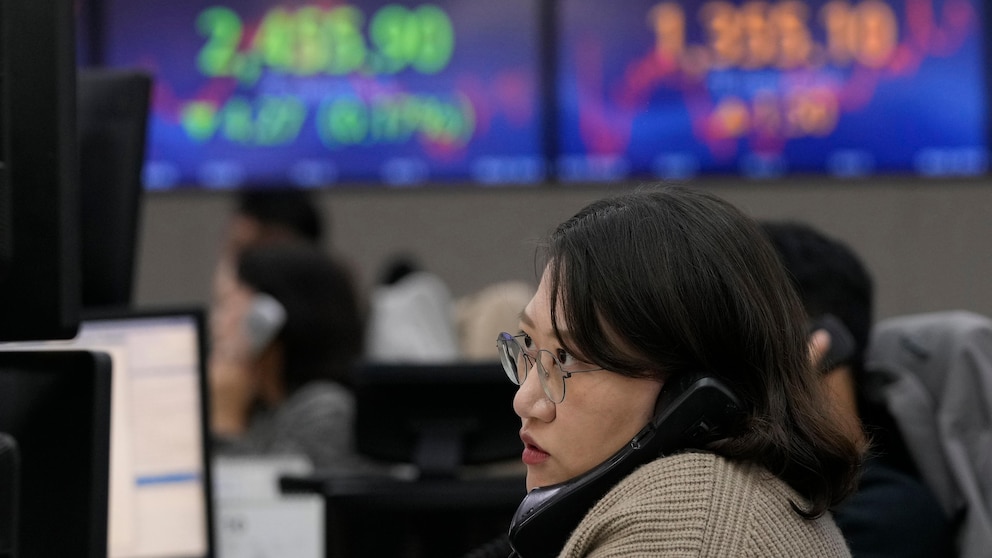
HONG KONG — Asian shares retreated Friday as the prospect of a 5% yield on the 10-year U.S. Treasury for the first time since 2007 added to pressure on Wall Street.
U.S. futures were lower while oil prices gained after the Department of Energy announced two separate offers of crude purchase intentions for the Strategic Petroleum Reserve, or SPR on Thursday. The offers comprise 6 million barrels, scheduled for delivery between December of this year and January 2024. The last time the Biden administration announced such purchase intentions was in July.
Tokyo’s Nikkei 225 index lost 0.5% to 31,266.84 after the government reported that consumer inflation was higher than expected in September. The core inflation rate, which excludes volatile fresh food prices, rose 2.8% from a year earlier in September.
It was the first time in 13 months that core CPI inflation has fallen below 3%. But when excluding both fresh food and fuel prices, inflation was 4.2%, still close to the 40-year peak of 4.3% recorded earlier this year.
China announced on Friday it was keeping its benchmark lending rates unchanged, with the one-year loan prime rate unchanged at 3.45% and the five-year LPR at 4.20%, in line with market expectations.
Hong Kong’s Hang Seng shed 0.4% to 17,236.04 and the Shanghai Composite index dropped 0.3% to 2,995.23.
The Kospi in Seoul lost 1.5% to 2,380.62. Australia’s S&P/ASX 200 sank 1.3% to 6,893.60. India’s Sensex was 0.4% lower and Bangkok’s SET fell 0.3%.
On Thursday, the S&P 500 fell 0.8%, to 4,278.00, following a mixed set of profit reports from Tesla and other influential companies. The Dow Jones Industrial Average dropped 0.7% to 33,414.17 and the Nasdaq composite sank 1% to 13,186.18.
Rapidly rising bond yields have been squeezing Wall Street since the summer. The yield on the 10-year Treasury touched 4.99%, up from 4.91% late Wednesday, before paring its gain to 4.98%. As the reference point for much of the financial world, the 10-year yield helps set prices for all kinds of investments and loans.
The 10-year yield has been on a swift march from less than 3.50% during the spring.
Fed Chair Jerome Powell said in a speech Thursday that the Fed could raise rates again if U.S. economic growth appears persistently strong. The Fed is raising rates in hopes they result in less inflation as businesses and consumers curb spending. A higher 10-year yield makes mortgages more expensive, knocks down prices for investments and makes it costlier for companies to borrow and grow.
A report Thursday showed the U.S. job market remains remarkably solid despite the much-higher rates. Fewer U.S. workers applied for unemployment benefits last week than expected, which indicates low levels of layoffs across the country.
A separate report, though, said manufacturing in the mid-Atlantic region is weakening by more than economists expected. And a third said sales of previously occupied homes fell last month, though not by as much as economists expected.
High yields hurt all kinds of stocks, but they hit particularly hard on those bid up on expectations for big growth far in the future and those seen as very expensive. That’s often put the spotlight on Big Tech recently, and some reported a mixed set of profits.
Tesla fell 9.3% after it reported weaker results for the summer than analysts expected. It’s been cutting prices to drive sales, but that also eats into its profitability.
On the opposite end was Netflix, which jumped 16.1%. It reported stronger profit for the latest quarter than analysts expected, and it said it would raise prices on some of its membership levels to drive more revenue.
Overall, analysts expect companies across the S&P 500 index to report slight growth in their earnings per share for the summer versus a year earlier. If they do, it would be the first such growth in a year.
Escalating conflict in the Middle East is fueling supply concerns, with a barrel of benchmark U.S. crude rising further 96 cents to $89.33 per barrel in electronic trading on the New York Mercantile Exchange. It increased $1.05 to settle at $89.37 on Thursday. Brent crude, the international standard, was up 81 cents to $93.19 per barrel.
In currency trading, the U.S. dollar rose slightly to 149.86 Japanese yen from 149.78 yen. The euro cost $1.0576, little changed from $1.0579.
Sourse: abcnews.go.com






